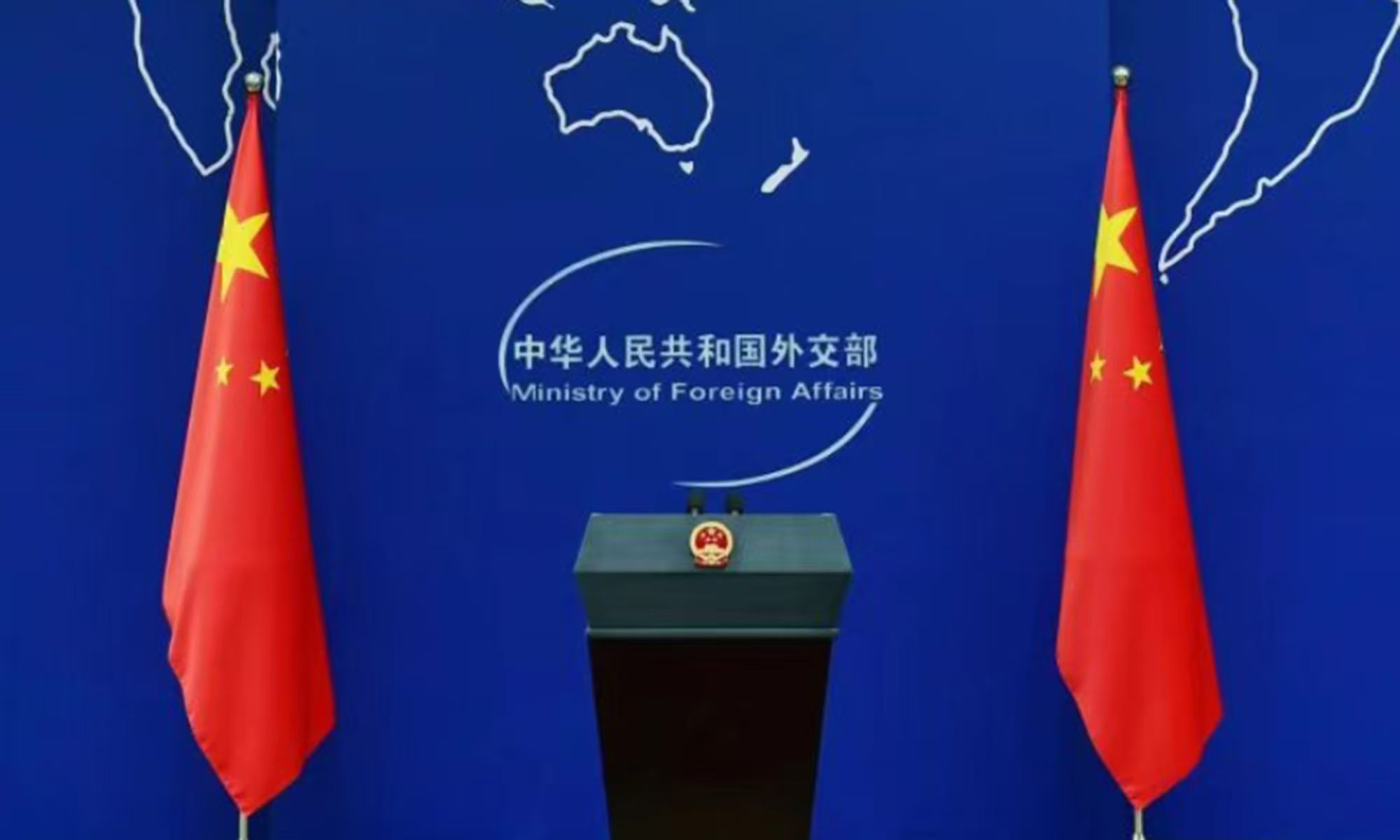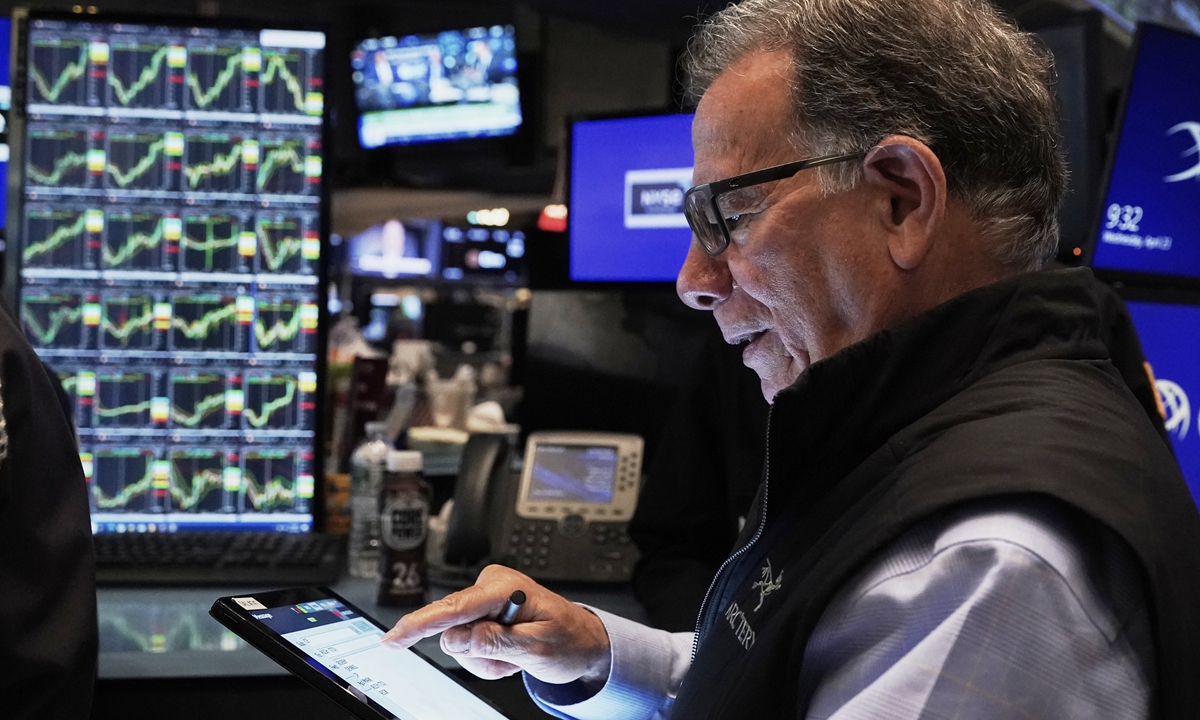China denies existence of tariff negotiation with US
A dozen US states sues to stop tariffs as domestic concerns grow

A trader watches monitors on the trading floor of the Frankfurt Stock Exchange on April 10, 2025. Photo: VCG
China on Thursday denied the existence of any consultation or negotiations on the issue of tariffs between China and the US, let alone an agreement on the matter, when Chinese foreign ministry spokesperson responded to media questions.
While there is no clear indication that the new US administration has eased its protectionist trade pressure on China, it has faced domestic setbacks and growing concerns, a Chinese expert remarked. For the US to genuinely return to the negotiating table, they need to demonstrate sincerity and take meaningful steps, he added.
At a regular press conference from China's Foreign Ministry on Thursday, a reporter noted that the US says that Beijing and Washington are holding talks and are even about to reach a deal. The reporter asked if China can confirm this and whether the two sides have started negotiations. In response, spokesperson Guo Jiakun said that this is false information. "None of that is true. As far as I know, China and the US are not having any consultation or negotiation on tariffs, still less reaching a deal," Guo said.
Guo further said that this tariff war was launched by the US. "China's position is consistent and clear: We will fight, if fight we must. Our doors are open, if the US wants to talk. Dialogue and negotiation must be based on equality, respect and mutual benefit," he said.
Asked to comment on US President Donald Trump's remarks that the US tariffs against Chinese goods were "very high" and will drop "substantially" and US Treasury Secretary's claim that the China-US tariff war will de-escalate, Chinese Commerce Ministry spokesperson He Yadong said on Thursday that the person who tied the bell must untie it.
The unilateral tariff increase was initiated by the US, and if the US really wants to solve the problem, it should heed the rational voices of the international community and domestic parties, completely cancel all unilateral tariff measures against China, and find a way to resolve differences through equal dialogue, He said.
The spokesperson further pointed out that the US' abuse of tariffs violates fundamental economic and market principles, and these measures fail to address the US' own issues while severely undermining the global economic order and disrupting normal business operations and consumer lives, facing strong opposition both internationally and in the US.
Mixed messages
The US has been sending mixed messages recently regarding tariffs. White House press secretary Karoline Leavitt said on Wednesday that the Trump administration will not unilaterally reduce tariffs imposed on China, CNBC reported.
Echoing Leavitt's comment, US Treasury Secretary Scott Bessent said on Wednesday that there were no plans for the Trump administration to move first in lowering tariffs to de-escalate a bitter US-China trade war, Reuters reported.
These remarks came as media reports that the Trump administration was considering slashing its steep tariffs on Chinese imports — in some cases by more than half — in a bid to de-escalate tensions with Beijing that have roiled global trade and investment. One senior White House official said the China tariffs were likely to come down to between roughly 50 percent and 65 percent, the Wall Street Journal reported, citing people familiar with the matter.
In a response to a question regarding the report by Wall Street Journal, and media reports that the US president claimed how soon the tariffs can come down "depends on China," the Chinese foreign ministry spokesperson said that this tariff war was unilaterally initiated by the US.
China's attitude is consistent and clear. If a negotiated solution is truly what the US wants, it should stop exerting extreme pressure, stop threatening and blackmailing China, and seek dialogue based on equality, respect and mutual benefit, Guo said.
Markets responded quickly to the tariff messages from the US government. US futures fell after the US Treasury Secretary cast doubt on a timely resolution to the trade war, Bloomberg reported on Thursday. Meanwhile, the dollar weakened as unpredictable White House policy moves boosted demand for the Swiss franc, the yen and gold as relative havens, the report said.
These mixed messages reflect current US administration's inconsistent stance on tariffs targeting China and point to a lack of internal consensus on this contentious issue, Gao Lingyun, a researcher at the Chinese Academy of Social Sciences in Beijing, told the Global Times on Thursday.
Moreover, Gao noted that the tariffs' impact on the US might have far exceeded what the new administration had anticipated — a reality reflected in recent stock market volatility and mounting opposition from American industries. Although there is no sign that the new US government has eased its protectionist trade pressure on China, it has encountered setbacks that were likely unforeseen, the expert said.
Widespread opposition
As the US wavers in its tariff stance amid an increasingly complex trade landscape that it created itself, domestic opposition continues to grow, with US businesses and consumers feeling the pressure as the impact of tariffs bites.
Three leading figures in American retail — Walmart's Doug McMillon, Target's Brian Cornell and Home Depot's Ted Decker - met with the US president at the White House to voice their concerns over proposed tariff policies. They warned that tariffs will raise consumer prices and could potentially disrupt retail supply chains and lead to product shortages, according to Bloomberg.
The US president's notable shift in tone toward Federal Reserve Chair Jerome Powell and China came a day after he met privately in the Oval Office with chief executives of four major US retail companies, who conveyed concerns about rising economic fallout from Trump's tariff policy and the uncertainty it has created for financial markets, the CNN reported.
These tariffs have placed significant pressure on the retail sector. The business leaders warned that store shelves across America could "soon be empty," two people familiar with the meeting said, as they presented a dire economic picture that could come into sharper view within weeks, the report said.
Another report by Forbes addressed a clear picture of the tariffs' impact on US consumers, citing estimates from the National Retail Federation that tariffs could cost Americans up to $78 billion in annual spending power across six categories of goods, Forbes reported.
Amid the concerns over tariff impacts, a dozen US states sued the Trump administration in the US Court of International Trade in New York on Wednesday to stop its tariff policy, saying they are unlawful and had damaged the American economy, the Associated Press (AP) reported on Thursday.
The lawsuit maintained that only Congress has the power to impose tariffs and that the president can only invoke the International Emergency Economic Powers Act when an emergency presents an "unusual and extraordinary threat" from abroad.
The states listed as plaintiffs in the lawsuit were Oregon, Arizona, Colorado, Connecticut, Delaware, Illinois, Maine, Minnesota, Nevada, New Mexico, New York and Vermont.
The Trump administration faces a similar lawsuit filed by the State of California, members of the Blackfeet Tribe in Montana, a paper goods business in Florida, and a company that produces educational toys in Washington DC, according to a Reuters report on Tuesday.
"More and more lawsuits come as no surprise, as the tariffs have no legal basis, since only the US Congress has the power to impose tariffs, while they also violate WTO rules," He Weiwen, a senior fellow at the Center for China and Globalization, told the Global Times on Thursday, noting that the sweeping tariffs are unsustainable.
"Amid the mixed signals sent out by the US, we're soberly aware that the US' goal of containing and suppressing China has not and will not change," Huo Jianguo, a vice chairman of the China Society for World Trade Organization Studies in Beijing, told the Global Times on Thursday, noting that China should continue to enrich its countermeasure reserves.
"The US must show sincerity and make good gestures if it truly wants to return to the negotiating table," he said.


